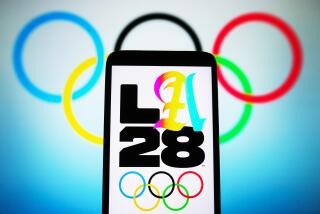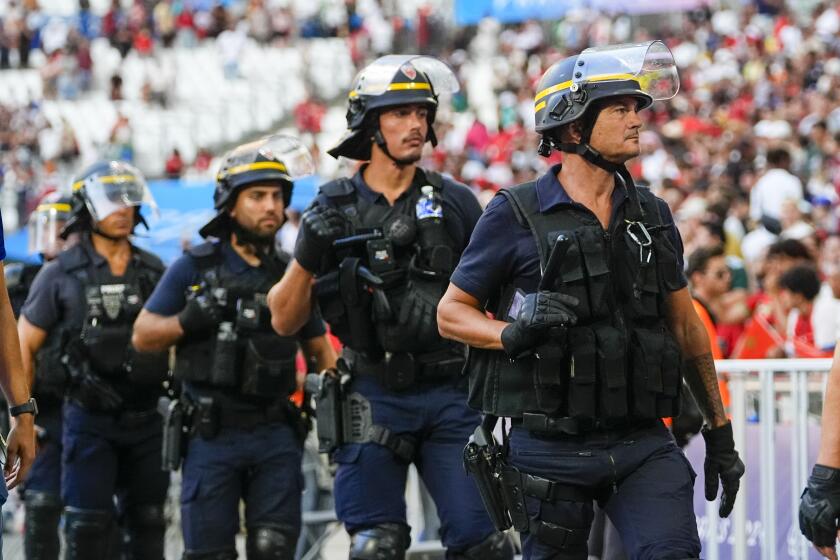Snowboarding goes from X Games to A-list
Not only were they invited into the Olympic family, but they also were practically pulled through the doorway by the International Olympic Committee, begged to join the winter party.
Snowboarding gave the IOC that desired crampon hold against television-ratings slippage and an increased presence in the youth market. In return, the Winter Olympics gave snowboarding just enough mainstream polish.
So, what to take from the sport’s fourth turn at the Winter Olympics?
The verdict from the first week in Vancouver suggests that it’s a win-win relationship for this seemingly mismatched couple, the X Games vibe and the old-school IOC.
“That’s what always happens -- it’s like when your favorite indie band hits it big,” said Peter Foley, the U.S. snowboard coach.
Gold-medal halfpipe winner Shaun White of the United States helped deliver a ratings bonanza for NBC on Wednesday night, thereby crushing “American Idol” -- drawing 30.1 million viewers to “Idol’s” 18.4 million.
He became the must-see celebrity in the athletes’ village. You could almost picture the to-do lists of Olympians: 1) Win a medal. 2) Get a picture of the Olympic caldron. 3) Have a picture taken with White.
American snowboarder Scott Lago called White the “Michael Jordan of boarding,” providing partial evidence of White’s Jordan-like appeal in Vancouver.
“For example, me, Greg [Bretz], Shaun and Louie [Vito] all walked into the cafeteria in the athletes’ village, and we had our Team USA jackets on,” said Lago, who won a bronze medal in the halfpipe. “Other teams were coming up and asking for autographs and taking pictures with us.
“That was pretty cool.”
Lago had been talking about the village experience before the Games started. Pictures and fame, though, cut the other way for Lago by Friday.
He apologized to U.S. Olympic Committee officials and left Vancouver after risqué photos from a party, showing a woman kissing his bronze medal in an area below his waist, surfaced on TMZ.com.
Look at it this way: Would TMZ.com bother to post a provocative picture of an American curler?
With success comes an extra level of scrutiny.
Silver medalist Hannah Teter was grilled about her pictures in the Sports Illustrated swimsuit issue, and White fielded a question from Playboy magazine about whether he smoked pot with Michael Phelps. White, for the record, said no, managing to answer the question in an amusing manner.
Lago was mildly irritated by one pre-event question.
“I wasn’t expecting the question I got: ‘Do you think it’s a legitimate sport?’ Oh, I don’t know. I guess we’re all a bunch of knuckle-draggers up here just cruising around,” he said.
Americans accounted for four of the six halfpipe medals at these Games. There were White and Lago on the men’s side and two past Olympic winners, Teter (silver) and Kelly Clark (bronze), on the women’s.
Additionally, American Seth Wescott repeated as the gold medalist in the snowboard cross event, which is truly in its Olympic infancy, on the program for the second time.
Teter and Clark were just as happy as the gold-medal winner, Torah Bright of Australia, at the post-event news conference. It would have been easy to think that Teter had won gold.
This was in keeping with Teter’s mode of operation. Four years ago, Teter and U.S. teammate Gretchen Bleiler left the halfpipe venue and went down another mountain on their snowboards between sessions.
Then they went one-two in Turin, Italy.
Here, snowboard cross rider Graham Watanabe talked about Pegasus mating with a unicorn and Teter said, “I love riding in the sun. I’m like a planet. I get a lot of energy from it.”
That innate free spirit could be why the snowboarders are so appealing to the fans in Vancouver and the viewing public in the U.S. and Canada. That, perhaps, and their daredevil tricks on the icy halfpipe walls.
“I’ve had people tell me that. These athletes and the way they operate really speaks to people, a genuine crew, a genuine family,” said Mike Jankowski, the halfpipe coach for the U.S. team.
“They keep it fun. It’s a genuine fun. It’s not fake, not contrived. They’re not distracted by the gravity of the Olympics.”
Olympic historian David Wallechinsky took a crack at it, speaking about White’s appeal.
“He’s fantastic to watch . . . and he’s not a jerk,” Wallechinsky said. “The same thing with Wescott. But if you were watching in Germany, Austria or Norway, you’d be seeing another whole set of heroes.”
They can be heroes, apparently, for more than one day.
And bring on snowmobile snocross.
twitter.com/reallisa
More to Read
Go beyond the scoreboard
Get the latest on L.A.'s teams in the daily Sports Report newsletter.
You may occasionally receive promotional content from the Los Angeles Times.







